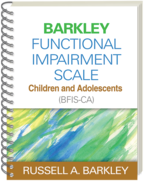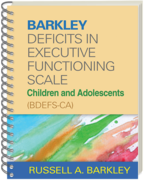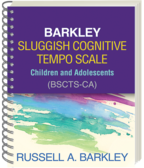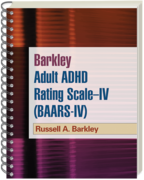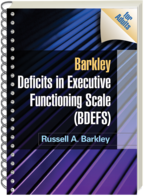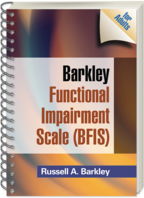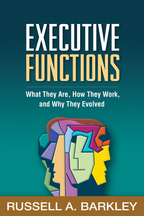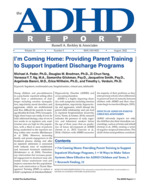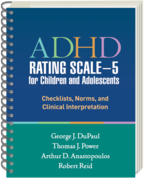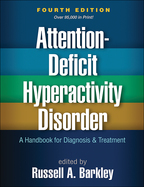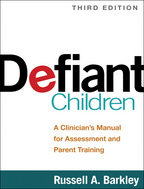Barkley Functional Impairment Scale—Children and Adolescents (BFIS-CA)
Russell A. Barkley
A Paperback Original
A Paperback Original
orderMay 9, 2012
ISBN 9781462503957
Price: $212.00 166 Pages
Size: 8" x 10½"
Convenient Wire Binding
Check out a special package offer including this title!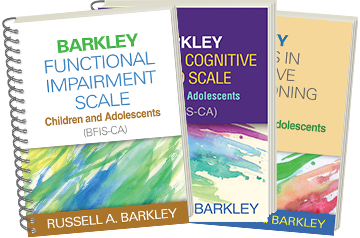

Read a Q&A with featured author, Russell A. Barkley!
Sign up for emails on upcoming titles by Russell A. Barkley (with special discounts)!
Sign up for emails on upcoming titles by Russell A. Barkley (with special discounts)!
The BFIS-CA has benefited from more than 30 years of research with its predecessor scale, the Home Situations Questionnaire (Barkley, 1981), and the subsequent development of the BFIS-CA from it. It has also benefited from the development of a comparable rating scale for assessing impairment in adults: the Barkley Functional Impairment Scale (BFIS).
Scores are obtained for 15 specific domains of major life activities, including relationships with parents, siblings, children in the neighborhood, and children at school; community activities; interactions with adults other than parents; school performance; self-care; money management; sports participation; and following rules, among other domains. Two broadband summary scores are computed for the Home–School mean impairment score (consisting of 9 domains) and the Community–Leisure mean impairment score (consisting of 6 domains). A total number of impaired domains score is also computed. These constitute the 18 primary scores. Eight additional questions provide further information on specific types of impairment related to friendships, community participation, sports, and educational performance and adjustment.
The large normative sample (N = 1,800) is representative of the U.S. population in terms of region, ethnicity/race, gender, and employment status, based on the 2000 U.S. Census. Unlike other comparable rating scales, the normative sample was not filtered to exclude children receiving special education or psychiatric medications.
Reliability
Reliability of the scores is quite satisfactory as evidenced by high internal consistency (Cronbach’s alpha of .97 for entire scale, and .95 and .96 for the Home–School and Community–Leisure mean impairment scores, respectively) and by high test–retest reliability over a 3–5 week interval (.86 for the Home–School mean impairment score; .83 for the Community–Leisure mean impairment score; .87 for the number of impaired domains score).
Validity
Validity of the scale scores is substantiated through high correlations with other rating scales of executive functioning and ADHD symptoms. Factor analysis also demonstrated a single broadband factor of impairment that comprises two narrower-band but interrelated dimensions of Home–School (work related) and Community–Leisure domains. Children and teens scoring high on the scale demonstrated impairment in separate measures of social unpopularity, community involvement, sports participation, teacher reports of behavioral or school performance problems, previous grade point average, and history of grade retention, suspension, or expulsion. Significant differences in BFIS-CA scores were demonstrated among children with and without various psychiatric, developmental, learning, and neurological diagnoses, as well as among children and teens receiving (or not receiving) various types of psychiatric, psychological, and educational treatment services.
More extensive technical information is provided in the manual.
Scores are obtained for 15 specific domains of major life activities, including relationships with parents, siblings, children in the neighborhood, and children at school; community activities; interactions with adults other than parents; school performance; self-care; money management; sports participation; and following rules, among other domains. Two broadband summary scores are computed for the Home–School mean impairment score (consisting of 9 domains) and the Community–Leisure mean impairment score (consisting of 6 domains). A total number of impaired domains score is also computed. These constitute the 18 primary scores. Eight additional questions provide further information on specific types of impairment related to friendships, community participation, sports, and educational performance and adjustment.
The large normative sample (N = 1,800) is representative of the U.S. population in terms of region, ethnicity/race, gender, and employment status, based on the 2000 U.S. Census. Unlike other comparable rating scales, the normative sample was not filtered to exclude children receiving special education or psychiatric medications.
Reliability
Reliability of the scores is quite satisfactory as evidenced by high internal consistency (Cronbach’s alpha of .97 for entire scale, and .95 and .96 for the Home–School and Community–Leisure mean impairment scores, respectively) and by high test–retest reliability over a 3–5 week interval (.86 for the Home–School mean impairment score; .83 for the Community–Leisure mean impairment score; .87 for the number of impaired domains score).
Validity
Validity of the scale scores is substantiated through high correlations with other rating scales of executive functioning and ADHD symptoms. Factor analysis also demonstrated a single broadband factor of impairment that comprises two narrower-band but interrelated dimensions of Home–School (work related) and Community–Leisure domains. Children and teens scoring high on the scale demonstrated impairment in separate measures of social unpopularity, community involvement, sports participation, teacher reports of behavioral or school performance problems, previous grade point average, and history of grade retention, suspension, or expulsion. Significant differences in BFIS-CA scores were demonstrated among children with and without various psychiatric, developmental, learning, and neurological diagnoses, as well as among children and teens receiving (or not receiving) various types of psychiatric, psychological, and educational treatment services.
More extensive technical information is provided in the manual.

